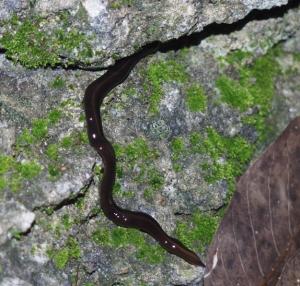by Stephanie Pappas
City Finding Creative New Ways To Combat Invasive Species
A bizarre invasive worm with its mouth in the middle of its
belly has been found in the United States for the first time, according
to new research.
The New Guinea flatworm (
Platydemus manokwari)
is only a couple of millimeters thick but grows to be up to 2.5 inches
(65 millimeters) long. As its name suggests, the worm is a New Guinea
native, but it has been spreading across the globe, hitching rides on
exotic plants and in soil. The worm wraps itself around snails and
ingests them with a mouthlike structure on its underside. As an invasive
species, it's a threat to native snails
— so much so that the Invasive Species Specialist Group of the
International Union for Conservation of Nature (IUCN) lists it among the
100 worst invasive species in the world.
The
flatworm had previously been detected in the wild in 15 countries, as
well as in a greenhouse in France, but this is the first time it's been
found in North America. A multinational group of researchers, led by
scientists at the Muséum National d'Histoire Naturelle in France, combed
through flatworm specimens and photographs collected by locals around
the world.
Spreading threat

The researchers discovered
P. manokwari
in five countries and territories where it had never been reported
before: New Caledonia, a small collection of islands in the southwest
Pacific; Singapore; the Solomon Islands, also in the southwest Pacific;
Puerto Rico; and Florida.
A New Guinea flatworm discovered in Coral Gables, Florida. This is the first report of this invasive …
The introduction of the species appeared to be recent in many
of these cases. The worm probably arrived in Florida in or around 2012,
the researchers reported in the
open-access journal PeerJ. Since then, it seems to have established itself and can now be found in multiple places in Miami-Dade County.
In
Puerto Rico, the worm showed up in San Juan, the capital, in 2014. The
first discovery of the worm in the Solomon Islands also occurred in
2014, on Guadalcanal.
Wormy genetics
The
researchers also discovered two genetic groups, or haplotypes, of the
worm. These two groups are virtually indistinguishable except on the
level of their genetic codes. One, dubbed the "Australian haplotype,"
was found only in Australia and the Solomon Islands. The other, dubbed
the "World haplotype," has been found in France, New Caledonia, French
Polynesia, Singapore, the Solomon Islands and Puerto Rico. The specimens
found in Florida also belonged to this World haplotype.
The genetic findings suggest that both haplotypes of worm exist in their native New Guinea, but that for unknown reasons, only the World haplotype has spread significantly, the researchers wrote.
The
discovery of the flatworm in the United States is particularly
concerning because the flatworm had previously been confined mostly to
small islands, they added. From Florida, however, P. manokwari could easily spread to the rest of the United States and the Americas.





















